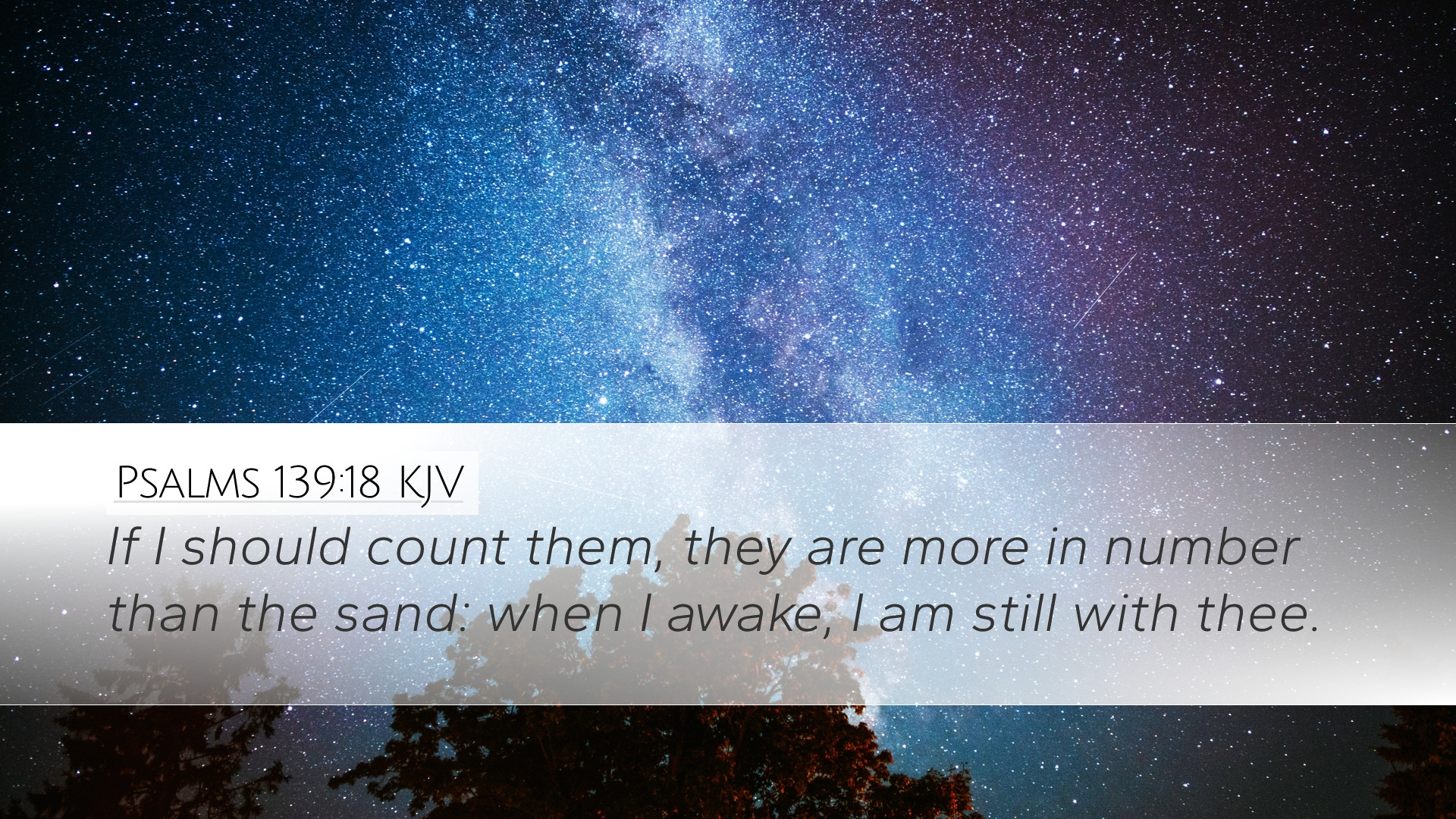Psalms 139:18 - A Summary of Commentary Insights
Verse Context: Psalms 139:18 states, "If I should count them, they are more in number than the sand: when I awake, I am still with thee." This verse encapsulates profound spiritual truths regarding God's omnipresence, His intimate knowledge of creation, and the overwhelming nature of His thoughts towards humanity.
Divine Omniscience
This verse is a profound testimony to God’s infinite and inexhaustible thoughts
. It recognizes that God's awareness and consideration of humanity far exceed human comprehension. The psalmist reflects on the vastness of God’s thoughts, likening them to grains of sand, which are innumerable and ever-present.
Commentary Insights:
-
Matthew Henry:
Henry emphasizes the boundless nature of God's thoughts towards His people. He mentions that God’s thoughts are not only numerous but also precious and full of wisdom. The psalmist's acknowledgment of God's overwhelming thoughts serves to highlight the intimacy of the divine relationship with humanity, as well as an invitation for believers to contemplate their own standing before such a mighty and thoughtful Creator.
-
Albert Barnes:
Barnes elaborates on the metaphor of sand, suggesting that just as sand is scattered across beaches and deserts, so too are God's thoughts pervasive and constant in a believer's life. He notes that this realization should evoke a sense of awe and reassurance, as believers are constantly enveloped by God's thoughts, indicating a perpetual divine presence that offers comfort and guidance.
-
Adam Clarke:
Clarke provides an analysis of the implications of being 'with God' upon waking. He posits that the thought of being in God's presence not only offers solace but should transform a believer’s perspective on life. Clarke highlights the joy that comes from recognizing that God's thoughts accompany us day and night, reflecting His ongoing involvement in the lives of His creation.
The Intimacy of God's Presence
In proclaiming, "when I awake, I am still with thee," the psalmist presents a profound affirmation of God's enduring presence. This notion of waking up in God's presence suggests the constancy of divine companionship, which transcends the boundaries of sleep and waking, life and death.
Commentary Insights:
-
Matthew Henry:
Henry comments on the comfort derived from this awareness of God's presence. He suggests that this verse serves not only as a declaration of God’s constancy but also as an encouragement for believers to cultivate a conscious awareness of God's presence throughout their daily lives.
-
Albert Barnes:
Barnes interprets the phrase "when I awake" as a reminder of God's presence that wraps around believers like a blanket of care and protection. To awaken still with God signifies the steadfast love and mercy that accompanies a believer from the first light of day until the last of night.
-
Adam Clarke:
Clarke posits that this verse alludes to a continuous dialogue between the believer and God. Waking 'with' God reflects the idea that every new day begins with an opportunity for fellowship and communion, thus serving as a spiritual invitation to engage with God’s will.
Spiritual Application for Believers
This verse highlights essential principles for the church, students of Scripture, and those in pastoral leadership. It challenges believers to reflect on the vastness of God’s thoughts and how those thoughts should inform their lives and ministries.
Commentary Insights:
-
Matthew Henry:
Henry encourages leaders and congregations alike to consider the significance of God's omniscience. His thoughts towards us–outlined in His Word–serve as foundational truths that should shape a believer’s identity and calling.
-
Albert Barnes:
Barnes stresses the importance of recognizing our value in God's eyes. Understanding that we are continually in His thoughts should encourage believers to trust in His plans for their lives and ministries without doubt or fear.
-
Adam Clarke:
Clarke urges believers to respond to God’s constant presence with action. He suggests that this acknowledgment should lead to a robust prayer life, reflecting upon God's thoughts through meditation and study of Scripture, hence deepening one’s relationship with Him.
Concluding Reflections
Psalms 139:18 exemplifies a rich theological understanding of God's nature as intimately involved with His creation. The reflections from Matthew Henry, Albert Barnes, and Adam Clarke collectively reinforce the essence of this verse, inviting believers of all backgrounds to dwell on the comfort and depth of being continuously known and loved by God.
Through personal contemplation and communal engagement with this passage, pastors, students, and scholars can inspire others to recognize and celebrate the profound truth that God’s thoughts towards us are more numerous than the grains of sand, offering both reassurance and a call to deeper faithfulness.


